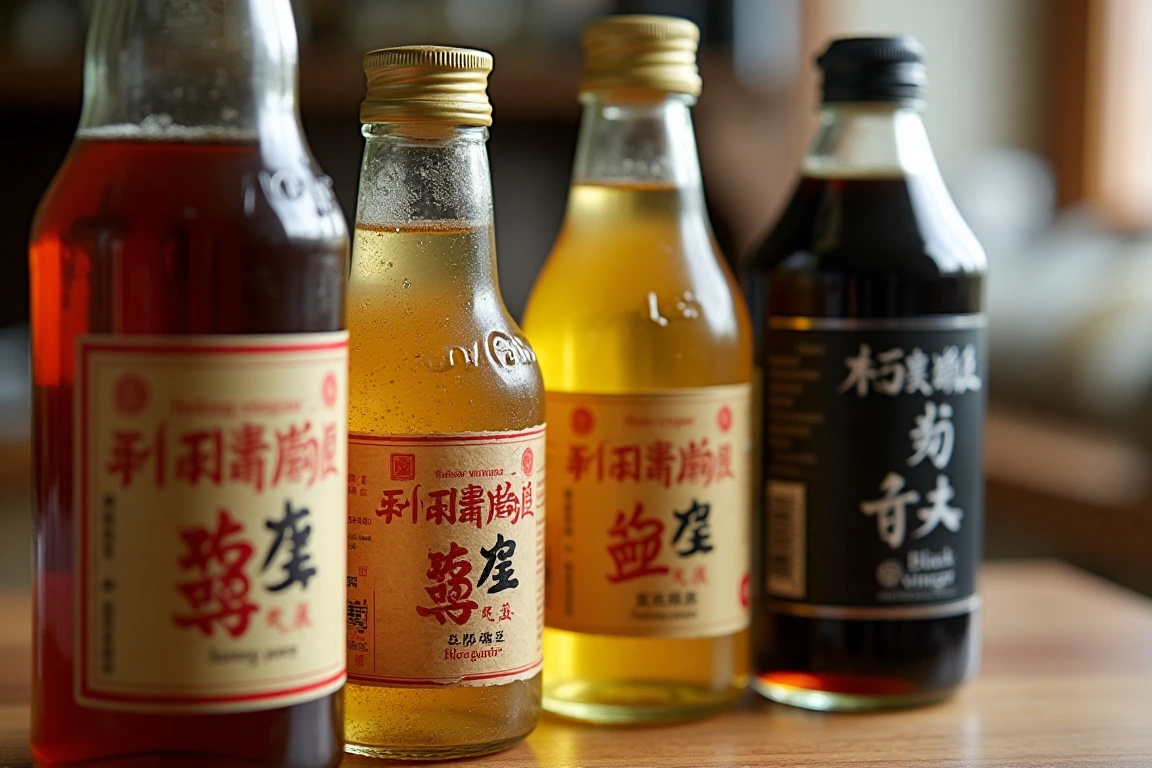Din Tai Fung Vinegar plays an indispensable role in shaping the culinary identity of this internationally renowned Taiwanese restaurant chain. With its tangy, multifaceted profile, vinegar has elevated traditional Chinese cuisine to an art form. It’s a subtle yet impactful thread that runs through many of Din Tai Fung’s signature dishes. In addition to enhancing flavor and balancing complicated ingredients Vinegar is a symbol of harmony and precision and harmony that Din Tai Fung has been renowned for.
Why Vinegar is an Essential Ingredient in Their Dishes
Vinegar is the foundation of many Asian cuisines and in the case of Din Tai Fung, it isn’t an exception. Its acidity serves multiple purposes—brightening flavors, cutting through the richness of certain dishes, and acting as a flavor enhancer. From its role in dipping sauces to its integration in marinades and recipes, vinegar contributes to the depth and complexity that make Din Tai Fung’s offerings stand out. For example, the vinegar-based dipping sauce is a quintessential accompaniment to their famous Xiao Long Bao (soup dumplings), enhancing the umami-rich broth and delicate wrapper with a touch of tanginess.
Ditch Dinner Stress — Cook Smart, Not Hard 🍽️
35 quick & budget-friendly 5-ingredient dinners to save your evenings. Simple. Delicious. Ready in 30 minutes or less.
The Unique Flavor Profile Vinegar Brings to the Table
The vinegar used in Din Tai Fung is as much about balance as it is about vigor. It doesn’t matter if it’s rice vinegar, black vinegar, or another type each one has an individual flavor. Black vinegar, specifically is sought-after for its deep and smoky sweet undertones that perfectly complement the subtle tastes of seafood, pork and even vegetables. It enhances the savory flavors and adds a hint to brighten the taste, making each bite refreshing and exciting.
Vinegar can also be used as an acidity cleanser, which prepares guests for their next meal. Its presence isn’t overwhelming however it is essential to provide an interesting edge to dishes which might otherwise seem too heavy or bland.
How Vinegar Complements Din Tai Fung’s Signature Dishes
Within Din Tai Fung’s cuisine vinegar is a key ingredient with other key dishes to provide an unbeatable dining experience. For instance, the interplay between the acidity of vinegar and the savoriness of soy sauce in the Xiao Long Bao dipping sauce is a study in contrast and harmony. It balances the soup dumplings’ unctuous filling, making the dish feel lighter and more refreshing.
Similarly, vinegar is a key ingredient in their hot and sour soup, contributing to the dish’s characteristic tanginess. It can cut through the spicy chili oil as well as the richness of egg ribbons. It creates an unbeatable flavor and aroma. Even in their noodle dishes, vinegar serves to enhance and unify flavors, whether it’s by adding zest to a cold noodle salad or bringing out the depth in a hot, broth-based dish.
The Main Vinegar Used at Din Tai Fung
At the heart of Din Tai Fung’s flavor mastery lies Zhenjiang Vinegar (also known as Chinkiang Vinegar), a staple that elevates their dishes with its rich complexity and versatility. This well-known Chinese white vinegar has become a key ingredient that highlights the authenticity and richness of Din Tai Fung’s culinary creations.
Zhenjiang Vinegar (Chinkiang Vinegar): The Vinegar of Choice
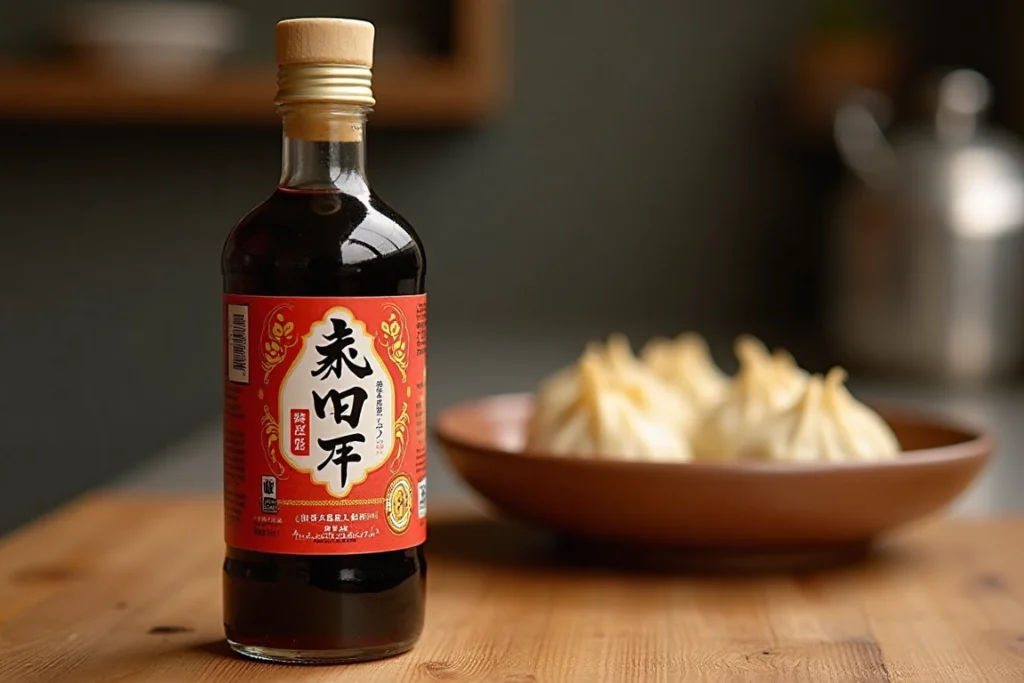
Zhenjiang Vinegar is a premium black vinegar originating from the Jiangsu province of China. Known for its distinctive flavor and unmatched versatility, it is a vital element in Din Tai Fung’s kitchen, seamlessly enhancing both traditional and modern recipes. Its reputation as a superior vinegar stems from its carefully crafted production process, which includes fermenting glutinous rice, water, wheat bran, and other grains to achieve its unique taste.
What Makes Zhenjiang Vinegar Different from Other Vinegars?
Unlike white vinegar, which is sharp and straightforward, or balsamic vinegar, which leans toward syrupy sweetness, Zhenjiang Vinegar strikes a perfect balance. Its rich, mellow taste, accompanied by subtle smokiness and a hint of sweetness, sets it apart. This complexity allows it to complement a wide array of ingredients, from delicate dumplings to robust noodle dishes. Additionally, the aging process of Zhenjiang Vinegar contributes to its depth, with time allowing its flavors to mature and harmonize.
The Rich, Dark, and Slightly Sweet Flavor Profile of Zhenjiang Vinegar
Zhenjiang Vinegar stands out for its deep, dark color and complex flavor. Its balanced acidity, paired with a hint of sweetness, creates a smooth, well-rounded taste that complements other ingredients without overshadowing them. Subtle smoky and earthy undertones add a layer of sophistication, making it an ideal choice for dishes that require depth and nuance. This delicate harmony is why it plays such a prominent role in Din Tai Fung’s menu.
How Zhenjiang Vinegar Enhances the Taste of Dipping Sauces and Dumplings
One of the most iconic uses of Zhenjiang Vinegar at Din Tai Fung is in the dipping sauce for Xiao Long Bao and other dumplings. The vinegar acts as a flavor bridge, connecting the savory fillings with the delicate wrapper and elevating the entire experience.
Balancing Sourness and Umami with Zhenjiang Vinegar
Zhenjiang Vinegar’s contribution to the dipping sauce is vital. It is able to balance the tartness with the umami-rich flavor of soy sauce as well as the fresh aroma of grated ginger. This harmony lets diners taste the full range of flavors that are present in every portion, from the soft wrapper to the rich broth, and the filling in the dumplings. The acidity of the vinegar cut through the richness making every bite feel fresh and refreshing.
Other Types of Din Tai Fung Vinegar
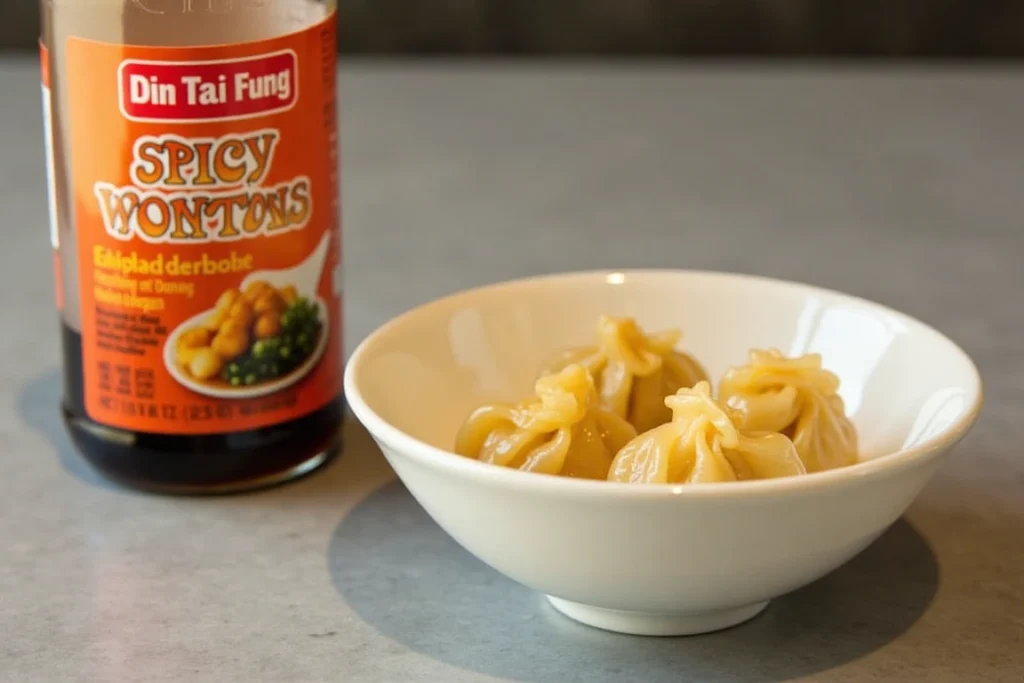
Rice Vinegar: A Delicate Touch in Spicy Wontons and More
Known for its subtle tang and gentle sweetness, rice vinegar is another essential ingredient in Din Tai Fung’s kitchen. It shines in dishes like spicy wontons, where its mild acidity balances the boldness of chili oil and soy sauce. This balance is key to creating a harmonious flavor experience.
The Unique Appeal of Rice Vinegar
Unlike the sharper acidity of many Western vinegars, rice vinegar offers a softer, milder profile. Its slightly sweet undertone complements and elevates the natural flavors of fresh vegetables, tender noodles, and rich broths. This makes it an ideal choice for recipes that require a gentle tang without overwhelming the dish.
Harmony with Soy Sauce and Chili Oil
Rice vinegar pairs beautifully with soy sauce and chili oil, providing a light acidity that contrasts with the savory depth of soy and the fiery intensity of chili. This interplay creates a balanced dipping sauce for spicy wontons, cutting through the richness of the chili oil while enhancing the umami of the soy sauce. The result is a satisfying and well-rounded flavor profile.
Black Vinegar vs. Zhenjiang Vinegar: Key Differences
The terms “black vinegar” and “Zhenjiang Vinegar” are often used interchangeably, but they’re not the same. Din Tai Fung uses both, depending on the desired flavor complexity in a dish.
- Black Vinegar
Black vinegar encompasses a broader category of Chinese vinegars, each with its own regional characteristics. It generally has a robust, earthy flavor and may vary in sweetness or intensity. - Zhenjiang Vinegar
A specific type of black vinegar, Zhenjiang Vinegar is prized for its balanced smoky, sweet, and tangy notes. Its nuanced profile makes it the preferred choice for dishes that require subtlety and refinement.
When to Use Each Type of Vinegar
- Zhenjiang Vinegar: Best for dishes where balance is crucial, such as dipping sauces or recipes that demand a lighter touch.
- Other Black Vinegars: Suited for dishes that benefit from a bold, caramel-like sweetness or a stronger earthy flavor.
- Rice Vinegar: Ideal for recipes that call for a light, fresh tang, such as cold noodle salads or delicate soups.
How to Recreate Din Tai Fung’s Vinegar-Based Sauces at Home
Recreating the iconic vinegar-based sauces from Din Tai Fung is easier than you might think, especially with the right ingredients and techniques. The signature dipping sauce, known for its delicate balance of tangy, savory, and aromatic flavors, can be mastered with a few simple steps.
Making the Signature Din Tai Fung Dipping Sauce with Zhenjiang Vinegar
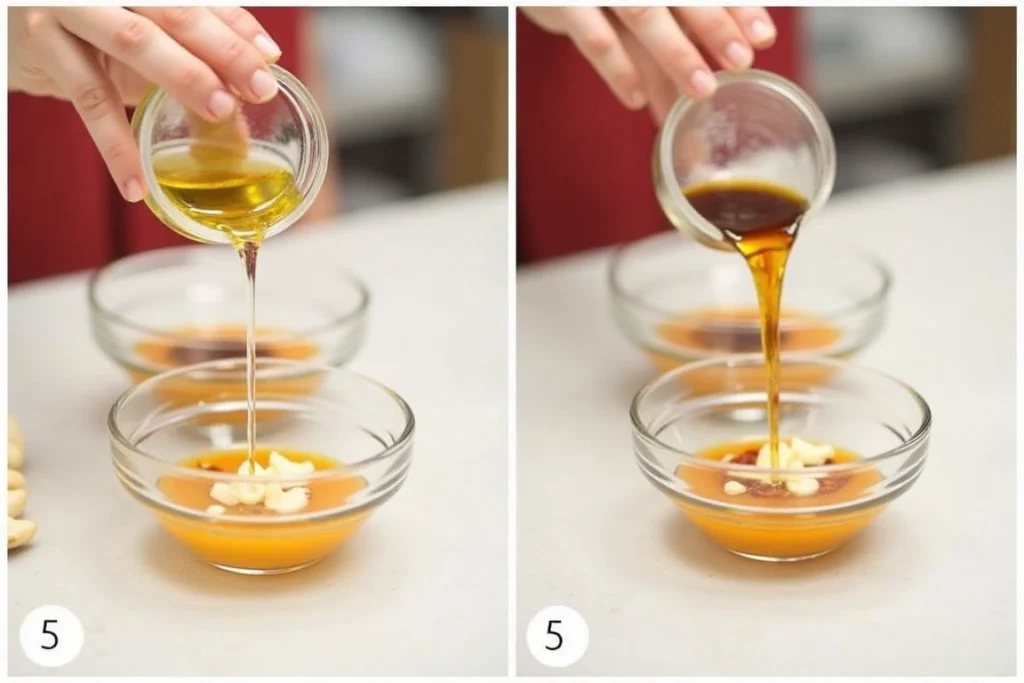
The signature dipping sauce for Din Tai Fung’s Xiao Long Bao and other dumplings is a simple yet highly refined combination of ingredients. The star of the sauce is Zhenjiang Vinegar, which provides the tangy, slightly sweet base that pairs perfectly with the savory richness of the dumplings.
Step-by-Step Guide to Creating the Perfect Dipping Sauce
To create Din Tai Fung’s dipping sauce at home, you’ll need the following ingredients:
- Zhenjiang Vinegar: 2 parts
- Soy Sauce: 1 part
- Fresh Ginger: Thinly julienned or finely grated
Instructions:
- Prepare the Ginger: Begin by slicing fresh ginger into thin julienne strips or grating it finely, depending on your preference. The ginger adds a refreshing, aromatic note to the sauce.
- Combine the Liquids: In a small bowl, mix two parts Zhenjiang Vinegar with one part soy sauce. Adjust the ratio slightly based on your taste preferences (e.g., more vinegar for tanginess or more soy sauce for savoriness).
- Add the Ginger: Place the ginger strips into the mixture and let it sit for a few minutes to infuse the sauce with its aroma and flavor.
- Serve: Pour the sauce into individual dipping bowls and serve alongside your dumplings, wontons, or other dishes.
Adjusting the Vinegar to Suit Your Flavor Preferences
The beauty of Din Tai Fung’s dipping sauce lies in its adaptability. While the standard ratio is 2:1 for vinegar and soy sauce, you can adjust it to create your perfect balance:
- For a Tangier Sauce: Increase the proportion of Zhenjiang Vinegar. This works particularly well if you enjoy a more pronounced acidic kick with your dumplings.
- For a Milder Flavor: Reduce the vinegar and increase the soy sauce for a smoother, more savory profile.
- For Extra Depth: Add a small drizzle of sesame oil to the mix, lending a nutty richness to the sauce.
- For Heat Lovers: Stir in a touch of chili oil to add a spicy edge, making the sauce ideal for wontons or noodles.
By following these steps and experimenting with the ratios, you can recreate the signature Din Tai Fung dipping sauce at home, perfectly tailored to your taste. This simple yet versatile sauce will bring a touch of Din Tai Fung’s culinary magic to your kitchen.
The Importance of Vinegar in Din Tai Fung’s Dipping Sauces
Vinegar is an essential ingredient in Din Tai Fung’s dipping sauces, playing a vital role in enriching the dining experience. It balances and enhances the flavors, perfectly complementing their signature dumplings with a complexity that leaves a lasting impression on diners. For instance, the vinegar-based sauce for Xiao Long Bao achieves a perfect balance of tanginess and umami, enhancing the dish’s overall appeal.
The Role of Vinegar in Enhancing the Dumpling Experience
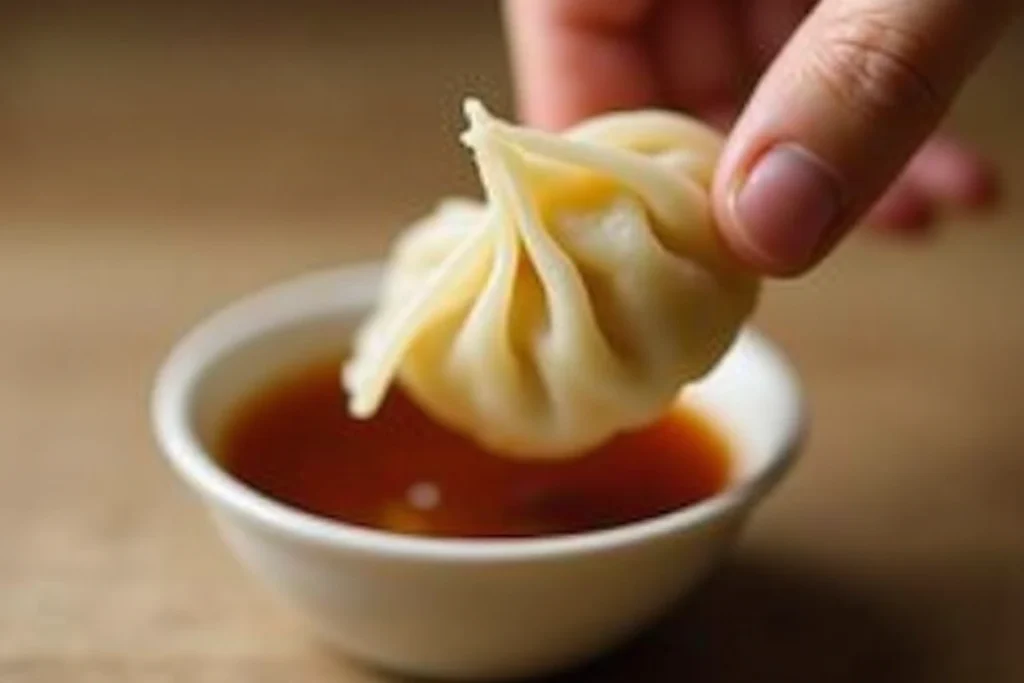
At Din Tai Fung, dipping sauces are not just condiments—they are integral to the enjoyment of dishes like Xiao Long Bao (soup dumplings) and spicy wontons. Vinegar forms the foundation of these sauces, providing a bright, tangy flavor that complements the dumplings’ rich and savory fillings.
How Vinegar Balances the Richness of Soup Dumplings
Xiao Long Bao, with their delicate wrappers and flavorful broth-filled centers, are a hallmark of Din Tai Fung’s menu. However, their richness can become overwhelming without the right accompaniment. This is where vinegar comes in. The tangy acidity of Zhenjiang Vinegar cuts through the unctuousness of the dumpling broth and pork filling, creating a more balanced bite.
The vinegar’s sharpness not only refreshes the palate but also enhances the dumpling’s intricate flavors, allowing the subtle notes of ginger, garlic, and soy to shine. It ensures that every bite remains as exciting as the first, preventing flavor fatigue and adding a refreshing contrast.
Vinegar as a Counterbalance to Spicy and Savory Flavors
In dishes like spicy wontons or hot and sour soup, vinegar acts as a vital counterbalance to bold flavors. The heat from chili oil or the saltiness of soy sauce can dominate without something to temper them, and vinegar does this job beautifully. Its acidity mellows the spice and prevents the saltiness from becoming overpowering, creating a harmonious flavor profile.
For instance, in a spicy dipping sauce, vinegar provides a tangy edge that lightens the overall flavor while still allowing the heat and umami to take center stage. This interplay ensures that diners experience a symphony of tastes with each bite, rather than being overwhelmed by any single element.
FAQs About Vinegar at Din Tai Fung
Vinegar is a crucial ingredient in Din Tai Fung’s renowned cuisine, and many diners are curious about its use. Here are answers to some of the most frequently asked questions about vinegar in their dishes.
What is the Best Substitute for Zhenjiang Vinegar if I Can’t Find It?
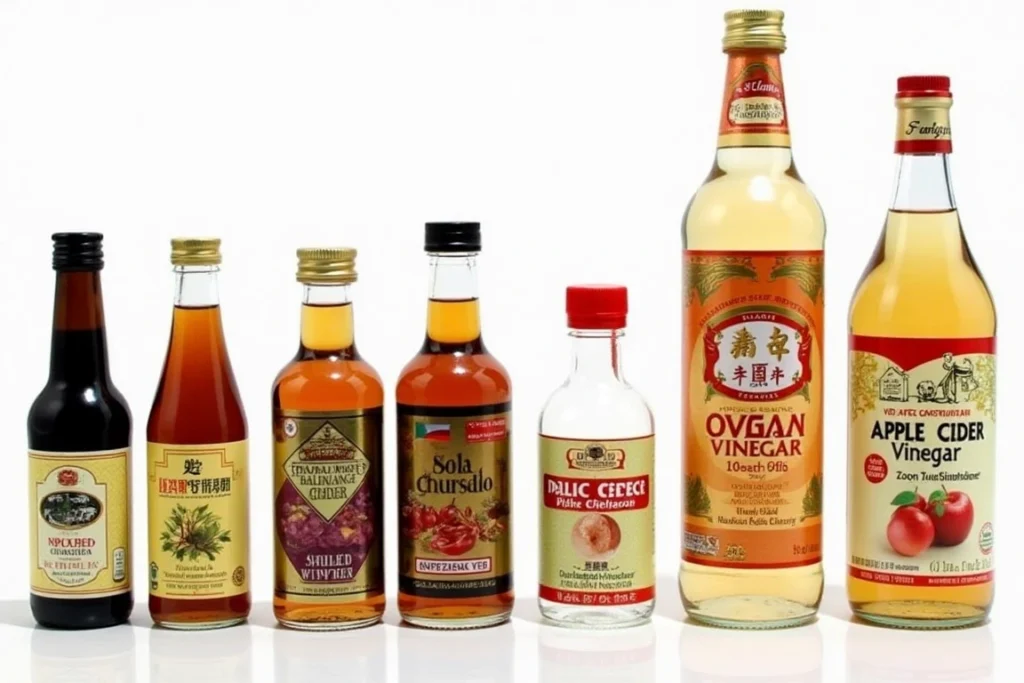
If Zhenjiang Vinegar is unavailable, you can substitute it with:
- Balsamic Vinegar: Although sweeter, it offers a similar richness and complexity. Mix with a touch of soy sauce to mimic the savory notes of Zhenjiang Vinegar.
- Rice Vinegar with a Splash of Soy Sauce: This combination provides a milder tang with a slight umami kick.
- Red Wine Vinegar with a Dash of Sugar: This alternative replicates the balance of acidity and sweetness found in Zhenjiang Vinegar.
While these substitutes won’t replicate the exact flavor, they can work well in most recipes.
Is the Vinegar Used at Din Tai Fung Vegan?
Yes, the vinegar used at Din Tai Fung, including Zhenjiang Vinegar and rice vinegar, is vegan. These vinegars are made from plant-based ingredients such as fermented rice or grains, making them suitable for vegan diets. However, it’s important to note that some dishes at Din Tai Fung may include non-vegan ingredients, so diners should confirm the specifics of a dish if they follow a vegan lifestyle.
Can I Use Different Vinegar in Din Tai Fung’s Dishes?
While Zhenjiang Vinegar and rice vinegar are preferred for authenticity, other vinegars can be used depending on the dish:
- Apple Cider Vinegar: Provides a lighter tang for dishes like cold noodles or salads.
- White Vinegar: Works for recipes requiring a sharper acidity, though it lacks the depth of Zhenjiang Vinegar.
- Balsamic Vinegar: Adds sweetness and depth but should be used sparingly in traditional dishes to avoid overpowering the flavors.
Experimenting with different vinegars can yield interesting results, but the unique flavor of Zhenjiang Vinegar is hard to replicate fully.
Why Does Din Tai Fung Use Vinegar in So Many of Their Dishes?
Vinegar is used extensively at Din Tai Fung because of its versatility and ability to balance flavors. It:
- Cuts Richness: Helps counter the unctuousness of rich dishes like soup dumplings.
- Adds Brightness: Enhances the natural flavors of ingredients by adding a tangy contrast.
- Balances Heat and Saltiness: Complements spicy and savory components in dishes like spicy wontons and hot and sour soup.
- Acts as a Flavor Enhancer: Brings depth and harmony to dipping sauces, soups, and noodles.
This thoughtful use of vinegar ensures that every dish is balanced and flavorful.
Is Zhenjiang Vinegar the Only Vinegar Used in Din Tai Fung’s Sauces?
No, Zhenjiang Vinegar is not the only vinegar used at Din Tai Fung. While it is the primary vinegar for many dishes and dipping sauces, rice vinegar is also commonly used. Rice vinegar’s milder acidity and subtle sweetness make it ideal for lighter dishes, such as cold noodles or salads. Din Tai Fung tailors the type of vinegar used to the specific flavor profile and requirements of each dish, showcasing their dedication to culinary precision.
Conclusion: The Significance of Vinegar in Din Tai Fung’s Cuisine and Dining Experience
Vinegar is far more than a simple ingredient at Din Tai Fung—it is a defining element that shapes the restaurant’s culinary identity and enhances the overall dining experience. Its versatility and unique flavor profiles allow it to elevate a wide range of dishes, from the tangy dipping sauces for Xiao Long Bao to the refreshing zest it brings to cold noodles and the harmonious balance it provides in hot and sour soup.
At Din Tai Fung, the thoughtful use of vinegar showcases the restaurant’s commitment to precision and flavor balance. Whether it’s the smoky complexity of Zhenjiang Vinegar or the light subtleness of rice vinegar, each type is carefully chosen to complement and enhance the dishes they accompany. Vinegar’s ability to cut through richness, balance bold flavors, and refresh the palate ensures that every bite is as satisfying as the last.
For diners, the presence of vinegar in Din Tai Fung’s dishes transforms the meal into a multi-dimensional experience. It brings harmony to complex flavors, making every dish not just a meal but a masterful orchestration of taste and texture. This thoughtful integration of vinegar is a testament to Din Tai Fung’s philosophy of simplicity, elegance, and attention to detail, cementing its reputation as a global icon in Chinese cuisine.
